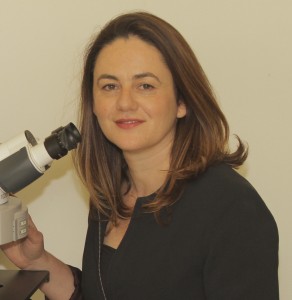Asya Rolls Lands HHMI Award
Asst. Prof. Asya Rolls of the Ruth and Baruch Rappaport Faculty of Medicine at Technion has been named a Howard Hughes Medical Institute (HHMI)-Wellcome International Research Scholar, a prestigious award for promising researchers outside the United States poised to advance biomedical research across the globe.
The focus of Rolls’s research is the effect of experiences in the brain on the immune system. “All emotions, all thoughts, affect specific brain regions,” she explains. “We will be able to manipulate the potential embedded in the brain to cure disease, by activating the reward system and potentially also many other systems.” Rolls adds, “Technion, one of few technological institutes with a medical school, offers the unique opportunity to harness technological capabilities along with medical developments.” Her research could reveal new ways to exploit the body’s inherent disease-fighting potential.
Five other Israeli researchers were also selected: Drs. Yosef Buganim and Idan Efroni of the Hebrew University of Jerusalem; and Drs. Eran Elinav and Shalev Itzkovitz, and Prof. Ido Amit of the Weizmann Institute of Science
HHMI has teamed up with the Bill & Melinda Gates Foundation, the Wellcome Trust, and the Calouste Gulbenkian Foundation to develop scientific talent around the world, and will award a total of nearly $26.7 million to 41 early-career scientists from 16 countries. Each researcher will receive a total of $650,000 over five years. The award is a big boon for scientists early in their careers, and offers the freedom to pursue new research directions and creative projects that could develop into top-notch scientific programs.
“This is an outstanding group of scientists who will push biomedical research forward worldwide, and we are thrilled to support them alongside our philanthropic partners,” said David Clapham, HHMI’s Vice President and Chief Scientific Officer.
The scientists selected as International Research Scholars represent a diverse array of scientific disciplines and geographic locations. Scholars hail from research organizations and institutions from across the world, from Tanzania to Cambodia to Chile to Austria. Their research covers a broad variety of biological and medical research areas including neuroscience, genetics, biophysics, computational biology, and parasitology.
“We are excited to join with our partners in supporting these superb scientists. We look to them to bring transformative innovation to priority global health problems,” said Chris Karp, Director of Global Health Discovery & Translational Sciences at the Bill & Melinda Gates Foundation.
These researchers’ goals are innovative, wide-ranging, and forward-thinking. They seek to understand diverse topics, from how immune cells function to how pathogenic bacteria jump from the environment to humans, and are even investigating ways to watch genes switch on and off in living brains.
“We are delighted to be a partner in supporting this outstanding community of international researchers. Their expertise and thirst for knowledge will enhance our understanding of how life works and the causes and consequences of disease,” said Anne-Marie Coriat, Head of Research Careers at Wellcome Trust.
A panel of distinguished scientists reviewed more than 1,400 applications and evaluated both the impact of past work, including doctoral and postdoctoral achievements, and the promise of work to come. It’s a researcher-focused approach that emphasizes the skills and talents of the individual, rather than solely the projects proposed.
“We are proud to partner with HHMI, the Bill & Melinda Gates Foundation, and the Wellcome Trust to support this truly exceptional group of young biomedical scientists. Biomedical research is increasingly at the core of the work of our research institute, the Instituto Gulbenkian de Ciência,” said Gulbenkian Institute Director Jonathan Howard.
The 2017 International Research Scholars competition was announced in March 2016 and was open to early-career scientists who held a full-time position at a research-oriented university, medical school, or nonprofit institution, and had been running their own labs for less than seven years. Candidates also had to work in an eligible country, and have received training in the United States or the United Kingdom for at least one year.



